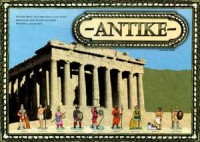
Antike
Antike is a challenging strategy game about evolution and competition among ancient civilizations.
Ancient nations create cities, build temples, sail the seas, and discover new principles of science and technology. Their legions and galleys open new settlements and defend their people against attacks from their enemies. Two scenarios can be chosen as the game board is two-sided.
Players choose from Greeks, Romans, and Germanic tribes and Phoenicians, Carthaginians, Persians, Arabs, Egyptians, and Babylonians. Every nation tries to win ancient kings, scholars, generals, citizens, and navigators for themselves. The nation that acquires a specified number (depending on the number of players) ancient personalities first will win the game!Lead one of these nations to victory! But watch out for your enemies, as they will want to conquer your cities to destroy your temples. The game depends not on the luck of dice or cards, but on thoughtful plans and skillful diplomacy.
User Reviews (1)
Add a Review for "Antike"
You must be logged in to add a review.

Antike excels in the board game as one of the most fun, easy to learn and challenging to play games of all.
All of the civilizations are balanced perfectly. The only difference is the area of the board you start in, which stablishes the distance between each player’s civilizations. You can pick one or randomly determine it by selecting the corresponding card, but make sure you use in the game the civilizations written on the same line as the numbers of participating players. Otherwise you’ll have players starting too close off and others with ample room to expand into.
No dice
Antike has zero randomness and few simple actions used during the whole game. Each turn you simply select the desired action by moving the pawn of your selected color up to three steps in the rondel.
The Rondel
The rondel is the central piece to the mechanic introduced by this game, it is simply a round circuit of squares used by the pawns to indicate the actions each player selected and which ones are available for their next turn.
That happens because you can move your pawns one to three squares away (in the same direction always); to move further you have to pay one resource per extra square moved.
Actions
You have the option of doing three kinds of actions: produce resource, use resource and move. Simply, on your turn you do one of these actions and your turn is done. Let’s see how each action can be described.
Produce resource: you have to land on the selected type of resource on the rondel (marble, iron or gold) and then you count how many cities your civilization has on regions containing that resource type. You receive that many resources of the selected type.
Use resource: expend as many resources you want of the selected type (as per the square you landed on the rondel) to build armies (using iron, one per ship or legion), erect temples (using marble, five for each and only one temple per region containing one of your cities), acquire new technologies (using seven gold for new level one techs if you are the first to develop it or just three if someone already had discovered it first).
Move move ALL of your ships and legions to one adjacent region or to a siege around a city in a region you were before. You may move part of your pieces if you so desire.
Points
Almost everything you can do in your game gives the players victory points. Whoever reaches a certain number of V.Ps. first (determined based on the number of players) wins the game.
You get points for discovering (but not simply acquiring) new technologies, by spreading your ships to navigate seven different seas (sea regions), settling three cities, building the temples or destroying a temple.
Combat
Whenever a ship or legion finishes it’s move in the same region as another ship or legion, there’s combat.
Simply, each unit kills one of the other color. So in a combat between three red legion units and two yellow legion units, the red player prevails with one red legion unit left. Ships and legions occupy different types of regions and never fight each other (but their numbers count as defense or offense when battling for a city).
If a city is taken, substitute the corresponding city piece for one of the conqueror’s color. A city requires the expenditure of one combat unit plus one for each of the city defenders and any other addition to its defense value.
Technologies
There are four kinds of technologies: terrestrial movement, aquatic movement, economic and political.
The level one technologies add one to their respective fields (movement for legions or ships, overall resource production for the economic field and city defense value for the politic field).
The level two technologies add two to their respective fields, instead of the bonuses from the corresponding previous tech level.
Temples
Temples simply add two to all game parameters in the region they are built (plus two to the city defense value, plus two to the city’s production and plus two army units produceable in the city, instead of one).
Summary
All in all, simply choose one of the three action types on the rondel, execute it and it’s the next player’s turn.
Antike can be played in one to two hours usually, but experienced players can play in as little as half an hour. Playing this game is an unique experience any hardcore gamer must have if he is to brag as being minimally knowledgeable in board games.
Casual gamers can enjoy playing Antike too provided they have a good explainer. Only party gamers won’t enjoy the game so much.
It’s an awesome classic that is always fun to play over and over. Antike really has proven itself and stood the test of time!